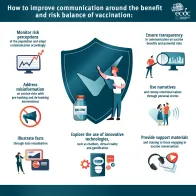Effective communication around the benefit and risk balance of vaccination in the EU/EEA
Executive Summary
Vaccination protects people against serious and potentially life-threatening infectious diseases: the World Health Organization (WHO) estimates that vaccination prevents 3.5 to 5 million deaths every year globally [1]. However, despite the importance of vaccines, numerous surveys done in European Union/European Economic Area (EU/EEA) countries show that the concerns of some people regarding the safety of vaccines as well as the perception that they are not effective pose a major challenge to the efforts of public health authorities to promote vaccine acceptance and uptake.
This report presents the results of a study that dealt specifically with effective communication around the benefit and risk balance of vaccination, people’s risk perceptions around vaccines and diseases, and approaches to enhancing communication about the safety and effectiveness of vaccines. The study was performed between June and November 2023, with an aim to increase knowledge about:
- How to communicate effectively about vaccination with a focus on its individual and community benefits outweighed against risks. The risks include the individual risk of contracting the disease and its outcomes, and potential risks associated with being vaccinated (i.e. side-effects).
- How people and communities perceive risks related to vaccines and infectious diseases.
- How the safety and effectiveness of vaccines can be better communicated to different audiences based on innovative and effective approaches.
This study used a literature review, an online survey, interviews and an online workshop to contribute to the knowledge base on these topics. The literature review consisted of a structured review of both grey and published literature to get an overview of existing, peer-reviewed and other academic literature, and other documentary evidence, and covered the period 2018 to 2023 (2015 to 2023 for review articles).
The work took into account lessons learned by public health organisations during the COVID-19 pandemic. In addition to COVID-19 vaccination, it also focused on recent influenza, MMR, and HPV vaccination campaigns conducted by public health organisations in the EU/EEA.
The findings of this study can support public health professionals in the EU/EEA involved in vaccination programmes, in particular in communication on vaccines, and other organisations in their work to promote vaccine acceptance and uptake in the EU/EEA.
Effective communication around balance of vaccination
English (7.21 MB - PDF)Complementary material to Effective communication
English (166.16 KB - PDF)Infographic

Infographic on how to improve communication around the benefit and risk balance of vaccination.
Share this page



